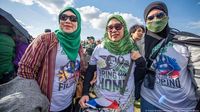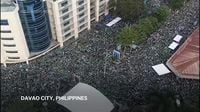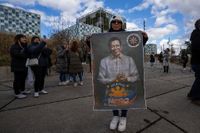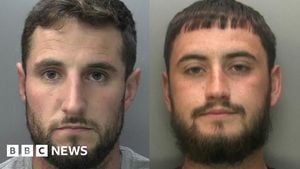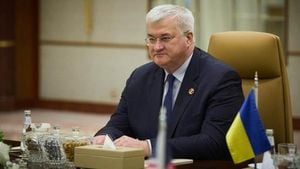Tens of thousands of people rallied in Davao City in the Philippines on Friday, March 28, 2025, in support of former president Rodrigo Duterte, who is marking his 80th birthday in detention in the Netherlands after the International Criminal Court (ICC) ordered his arrest. The event drew significant attention as supporters gathered to celebrate Duterte's legacy, while also protesting his ongoing detention and the serious charges he faces.
Duterte, who served as president from 2016 to 2022, is currently held in The Hague, facing accusations of crimes against humanity linked to his controversial "war on drugs," which has resulted in the deaths of thousands of people. His supporters, however, remain fervent in their belief that he has been unjustly treated. “As a Filipino and Davao City citizen, it pains us to see what they did to him. It was unjust. They should not have arrested him,” one supporter stated, highlighting the emotional connection many Filipinos feel toward their former leader.
In Manila, dozens of activists brought black balloons, symbolizing their calls for justice for the victims of Duterte's drug war, while some of his supporters gathered near a church, demanding his release. The dichotomy of sentiments was palpable, with supporters chanting his name in Davao City during a street protest, praying for his release, and even singing a birthday song to a cardboard cutout of him. “We hope that he will be back in the Philippines as soon as possible,” said Aldwin Villarta, an organizer of the event in The Hague.
Philippine Vice President Sara Duterte, the former president's daughter, has been in The Hague since shortly after his arrest on March 11, 2025. She expressed gratitude for the support her father has received, stating that it “makes the challenges he is facing today more bearable.”
Outside the detention center in The Hague, hundreds gathered with a sound system blasting music, punctuated by calls for Duterte’s release. His lead defense lawyer, Nicholas Kaufman, mentioned that Duterte was aware of the large gatherings in his honor and was touched by the outpouring of support. “We will work to ensure that he will celebrate future birthdays in their company,” Kaufman assured.
Duterte's legal troubles began when he was taken by the ICC on March 11, 2025, following a warrant issued for his arrest due to his alleged role in orchestrating a drug war that has resulted in the deaths of an estimated 30,000 people, according to human rights organizations. Chief ICC prosecutor Karim Khan disclosed that 181 unspecified items of evidence have been presented to the defense, indicating the seriousness of the charges against him.
Meanwhile, Filipino migrant workers from various parts of Europe are also making their way to The Hague to show their support for Duterte while demanding his immediate release and repatriation to the Philippines. “It is very important that we show our support, wish the former president a happy birthday. We want him to be sent back to the Philippines,” said Pong Pena, a migrant worker in London, as he prepared to depart for The Hague.
Jaime Adriano, another overseas Filipino worker living in Berlin, shared plans for a series of birthday celebrations across different restaurants in his city. He expressed his discontent with Duterte's arrest, stating, “It was not right. We surrendered one of our own to foreign powers. It was so painful.” Adriano also mentioned his commitment to a “zero remittance” movement, where he and others plan to withhold money sent back home to draw attention to their pleas for Duterte's release.
The Philippine Central Bank reported remittances at a record high of $34.49 billion (€31.88 billion) in 2024, which contribute an estimated 8%-10% of the country's GDP. This financial support underscores the significant role that overseas Filipino workers play in the economy, yet it also highlights the potential impact of their protest actions.
However, not all Filipino migrant workers support Duterte. Lean Jimenez, coordinator of Bayan Europe, an alliance of progressive Filipino organizations, noted that there is a growing movement among members from ten countries in Europe calling for justice for the victims of Duterte's drug war and other extrajudicial killings. Jimenez stated, “They may be loud but that does not mean that they are the majority, and that does not mean that they are correct.”
Joey Sison, a Filipino migrant worker from Stuttgart, Germany, is also taking a six-hour train ride to join the protests in The Hague. He expressed his motivation for attending, saying, “Not for Duterte's birthday but for the families who lost their loved ones in the bloody drug war and extrajudicial killings.”
As the rallies continued to unfold across the Philippines and in The Hague, the situation remains complex and deeply divisive. Duterte's supporters celebrate his legacy and demand his return, while activists and critics call for accountability for the alleged atrocities committed during his presidency. The upcoming months will be critical as Duterte awaits his next court appearance on September 23, 2025, where he will have the opportunity to contest the charges against him.
The global spotlight on Duterte's case not only reflects the ongoing struggle for justice in the Philippines but also raises broader questions about governance, human rights, and the rule of law in the region.

